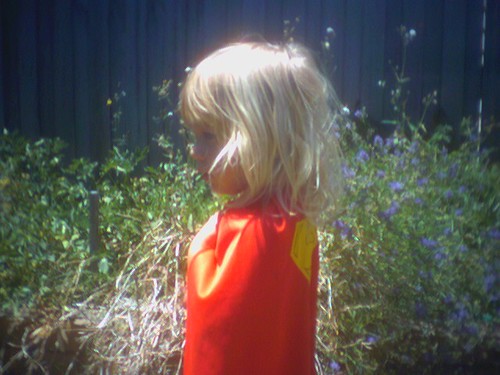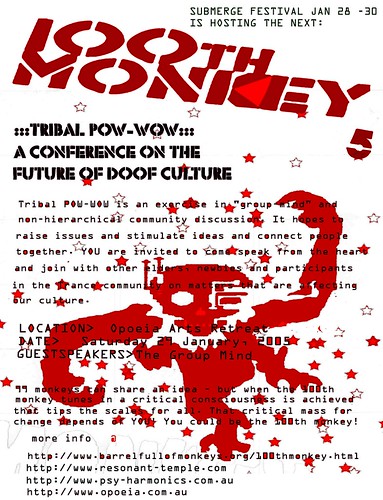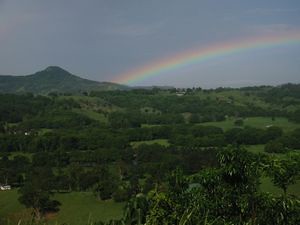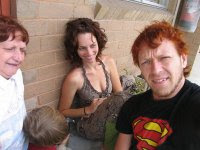In a Perfect World
Autopoetic lapis from the neo-cortex, focused diamond will that chisels reality for cultural meme-sculpting and some random word jamming to detourne the information warscapes during the decline of Western Civilisation and the birth of the Grand Unified Paradigm. I blog. I.am.rak.
Friday, January 21, 2005
Wednesday, January 19, 2005
100th Monkey 5
SUBMERGE FESTIVAL 28 - 30 JAN IS HOSTING THE NEXT:
100th MONKEY 5: TRIBAL POW-WOW!
TRIBAL POW-WOW is a meeting of minds to discuss the state of doof
culture and where it's headed, as well as it's response to the rapidly
militant, right-wing world around it. YOU are invited to come speak
from the heart and join with other elders and participants in the
Trance community on matters that are affecting our culture. The Tribal
POW-WOW is an exercise in "group-mind" and non-hierarchical community
discussion. It hopes to raise issues and stimulate ideas and connect
people together.
full details at :
http://www.resonant-temple.com
http://www.psy-harmonics.com.au
http://www.opoeia.com.au
Possible themes to discuss or not as Group Mind decides:
* Return of the sacred - can doof culture integrate the sacred over the
commercial? Use of sacred geometry, vibe and magickal principles to
organise a gathering...
* Hopi prophecies fortell a 'Rainbow Tribe' made up of the children of
all nations that come together to re-connect with the earth and lead
towards a new way. Is doof culture part of this tribe? What practical
steps are needed to work together as a community, not just a
party-culture?
* Technology is rapidly accelerating the mainstream world but what
technologies is doof culture using? And how does technology affect us?
Internet based social networking software helps communities find each
other. Flash-smart mob partying uses tek to steal back the spectacle,
etc.
* War on Drugs. New Victoria based random drug testing is directly
targeting 'rave' and outdoor parties and WILL affect you. What are your
rights, what are your responsibilities?
* Community building. After the party - what then? Land, community,
lifestyle. Setting up your own community and creating your own
lifestyle beyond the dancefloor...
Audio recordings from the POW-WOW sessions will be available for later
listening @ http://www.barrelfullofmonkeys.org/100thmonkey.html
LOCATION>
OPOEIA ECO-ARTS RETREAT
DATE>
SATURDAY 29TH JAN, 2005
GUESTSPEAKERS>
THE GROUP MIND
99 monkeys can share an idea - but when the 100th monkey tunes in a
critical consciousness is achieved that tips the scales for all. That
critical mass for change depends of YOU!
You could be the 100th monkey!
Thursday, January 06, 2005
The cause of Tsunami is earthâs melting of permafrost in artic circle due to global warming: Indian Scientists
http://www.indiadaily.com/editorial/01-04g-05.asp
The cause of Tsunami is earthâs melting of permafrost in artic circle
due to global warming: Indian Scientists â many more global landslides
and earthquakes possible
Dr. Sandhya Mukherjee, Special Correspondent
January 04, 2005
The collapse of land when permafrost thaws
Rising temperatures in the Arctic are melting the permafrost, causing
it to release greenhouse gases into the atmosphere. About 14 per cent
of the world's carbon is stored in the permafrost of Arctic lands.
Permafrost, which is a solid structure of frozen soil and on which can
be used to build homes and other buildings, can, with rising
temperatures, turn into a soft material causing subsidence and damage
to buildings and structures. But worse yet is if, as a positive
feedback, it loses its characteristic as a carbon sink and begins
leaking carbon dioxide into the atmosphere. This is a typical effect of
global warming.
According to some Indian scientists, the melting of permafrost has far
reaching effects on earthâs crust. The tectonic plates are susceptible
to forces on different parts of the world including the Artic and
Antarctic regions. The new theory says if the crust of the earth is
imbalanced due to tremendous effect of global warming and melting of
permafrost.
The ice experiences a cyclical ice ages and warm time. We are in the
warm cycle. It has been observed, that during the receding ice ages in
the past which means natural warming, ocean currents, Artic and
Antarctic crustsâ imbalances, the tectonic movements increase. Worse is
the fact that the tectonic movements increase in thrust and violent
characteristics. It is at this time world experience 9 and above
Richter scale earthquakes â many of them all over the world in a short
period of time.
According to these scientists we may be experiencing similar
phenomenon where all on a sudden tectonic movements devastate the
world.
The tsunami that happened was caused by an earthquake along a 600 mile
fault line that got displaced. That is not common. It really never
happened in recent history of the world.
Interestingly, the Tsunami traveled westwards at 500 miles per hour
and did not traverse in the south with that kind of high velocity.
According to the scientific analysts, that is another sign that this
was caused by melting of permafrost in the Artic.
Web
www.indiadaily.com
Â
Â
Tuesday, January 04, 2005
God (or Not), Physics and, of Course, Love: Scientists Take a Leap
January 4, 2005
God (or Not), Physics and, of Course, Love: Scientists Take a Leap
What do you believe is true even though you cannot prove it?"
This was the question posed to scientists, futurists and other creative
thinkers by John Brockman, a literary agent and publisher of The Edge,
a Web
site devoted to science. The site asks a new question at the end of each
year. Here are excerpts from the responses, to be posted Tuesday at
www.edge.org.
Roger Schank
Psychologist and computer scientist; author, "Designing World-Class
E-Learning"
Irrational choices.
I do not believe that people are capable of rational thought when it
comes
to making decisions in their own lives. People believe they are behaving
rationally and have thought things out, of course, but when major
decisions
are made - who to marry, where to live, what career to pursue, what
college
to attend, people's minds simply cannot cope with the complexity. When
they
try to rationally analyze potential options, their unconscious,
emotional
thoughts take over and make the choice for them.
Richard Dawkins
Evolutionary biologist, Oxford University; author, "The Ancestor's Tale"
I believe, but I cannot prove, that all life, all intelligence, all
creativity and all "design" anywhere in the universe, is the direct or
indirect product of Darwinian natural selection. It follows that design
comes late in the universe, after a period of Darwinian evolution.
Design
cannot precede evolution and therefore cannot underlie the universe.
Judith Rich Harris
Writer and developmental psychologist; author, "The Nurture Assumption"
I believe, though I cannot prove it, that three - not two - selection
processes were involved in human evolution.
The first two are familiar: natural selection, which selects for
fitness,
and sexual selection, which selects for sexiness.
The third process selects for beauty, but not sexual beauty - not adult
beauty. The ones doing the selecting weren't potential mates: they were
parents. Parental selection, I call it.
Kenneth Ford
Physicist; retired director, American Institute of Physics; author, "The
Quantum World"
I believe that microbial life exists elsewhere in our galaxy.
I am not even saying "elsewhere in the universe." If the proposition I
believe to be true is to be proved true within a generation or two, I
had
better limit it to our own galaxy. I will bet on its truth there.
I believe in the existence of life elsewhere because chemistry seems to
be
so life-striving and because life, once created, propagates itself in
every
possible direction. Earth's history suggests that chemicals get busy and
create life given any old mix of substances that includes a bit of
water,
and given practically any old source of energy; further, that life, once
created, spreads into every nook and cranny over a wide range of
temperature, acidity, pressure, light level and so on.
Believing in the existence of intelligent life elsewhere in the galaxy
is
another matter.
Joseph LeDoux
Neuroscientist, New York University; author, "The Synaptic Self"
For me, this is an easy question. I believe that animals have feelings
and
other states of consciousness, but neither I nor anyone else has been
able
to prove it. We can't even prove that other people are conscious, much
less
other animals. In the case of other people, though, we at least can
have a
little confidence since all people have brains with the same basic
configurations. But as soon as we turn to other species and start asking
questions about feelings and consciousness in general we are in risky
territory because the hardware is different.
Because I have reason to think that their feelings might be different
than
ours, I prefer to study emotional behavior in rats rather than emotional
feelings.
There's lots to learn about emotion through rats that can help people
with
emotional disorders. And there's lots we can learn about feelings from
studying humans, especially now that we have powerful function imaging
techniques. I'm not a radical behaviorist. I'm just a practical
emotionalist.
Lynn Margulis
Biologist, University of Massachusetts; author, "Symbiosis in Cell
Evolution"
I feel that I know something that will turn out to be correct and
eventually
proved to be true beyond doubt.
What?
That our ability to perceive signals in the environment evolved
directly
from our bacterial ancestors. That is, we, like all other mammals
including
our apish brothers detect odors, distinguish tastes, hear bird song and
drumbeats and we too feel the vibrations of the drums. With our eyes
closed
we detect the light of the rising sun. These abilities to sense our
surroundings are a heritage that preceded the evolution of all
primates, all
vertebrate animals, indeed all animals.
David Myers
Psychologist, Hope College; author, "Intuition"
As a Christian monotheist, I start with two unproven axioms:
1. There is a God.
2. It's not me (and it's also not you).
Together, these axioms imply my surest conviction: that some of my
beliefs
(and yours) contain error. We are, from dust to dust, finite and
fallible.
We have dignity but not deity.
And that is why I further believe that we should
a) hold all our unproven beliefs with a certain tentativeness (except
for
this one!),
b) assess others' ideas with open-minded skepticism, and
c) freely pursue truth aided by observation and experiment.
This mix of faith-based humility and skepticism helped fuel the
beginnings
of modern science, and it has informed my own research and science
writing.
The whole truth cannot be found merely by searching our own minds, for
there
is not enough there. So we also put our ideas to the test. If they
survive,
so much the better for them; if not, so much the worse.
Robert Sapolsky
Neuroscientist, Stanford University, author, "A Primate's Memoir"
Mine would be a fairly simple, straightforward case of an unjustifiable
belief, namely that there is no god(s) or such a thing as a soul
(whatever
the religiously inclined of the right persuasion mean by that word). ...
I'm taken with religious folks who argue that you not only can, but
should
believe without requiring proof. Mine is to not believe without
requiring
proof. Mind you, it would be perfectly fine with me if there were a
proof
that there is no god. Some might view this as a potential public health
problem, given the number of people who would then run damagingly amok.
But
it's obvious that there's no shortage of folks running amok thanks to
their
belief. So that wouldn't be a problem and, all things considered, such a
proof would be a relief - many physicists, especially astrophysicists,
seem
weirdly willing to go on about their communing with god about the Big
Bang,
but in my world of biologists, the god concept gets mighty infuriating
when
you spend your time thinking about, say, untreatably aggressive
childhood
leukemia.
Donald Hoffman
Cognitive scientist, University of California, Irvine; author, "Visual
Intelligence"
I believe that consciousness and its contents are all that exists.
Space-time, matter and fields never were the fundamental denizens of the
universe but have always been, from their beginning, among the humbler
contents of consciousness, dependent on it for their very being.
The world of our daily experience - the world of tables, chairs, stars
and
people, with their attendant shapes, smells, feels and sounds - is a
species-specific user interface to a realm far more complex, a realm
whose
essential character is conscious. It is unlikely that the contents of
our
interface in any way resemble that realm.
Indeed the usefulness of an interface requires, in general, that they
do
not. For the point of an interface, such as the Windows interface on a
computer, is simplification and ease of use. We click icons because
this is
quicker and less prone to error than editing megabytes of software or
toggling voltages in circuits.
Evolutionary pressures dictate that our species-specific interface,
this
world of our daily experience, should itself be a radical
simplification,
selected not for the exhaustive depiction of truth but for the mutable
pragmatics of survival.
If this is right, if consciousness is fundamental, then we should not be
surprised that, despite centuries of effort by the most brilliant of
minds,
there is as yet no physicalist theory of consciousness, no theory that
explains how mindless matter or energy or fields could be, or cause,
conscious experience.
Nicholas Humphrey
Psychologist, London School of Economics; author,"The Mind Made Flesh"
I believe that human consciousness is a conjuring trick, designed to
fool us
into thinking we are in the presence of an inexplicable mystery. Who is
the
conjuror and why is s/he doing it? The conjuror is natural selection,
and
the purpose has been to bolster human self-confidence and
self-importance -
so as to increase the value we each place on our own and others' lives.
Philip Zimbardo
Psychologist, emeritus professor, Stanford; author, "Shyness"
I believe that the prison guards at the Abu Ghraib Prison in Iraq, who
worked the night shift in Tier 1A, where prisoners were physically and
psychologically abused, had surrendered their free will and personal
responsibility during these episodes of mayhem.
But I could not prove it in a court of law. These eight Army reservists
were trapped in a unique situation in which the behavioral context came
to
dominate individual dispositions, values and morality to such an extent
that
they were transformed into mindless actors alienated from their normal
sense
of personal accountability for their actions - at that time and place.
The "group mind" that developed among these soldiers was created by a
set
of known social psychological conditions, some of which are nicely
featured
in Golding's "Lord of the Flies." The same processes that I witnessed
in my
Stanford Prison Experiment were clearly operating in that remote place:
deindividuation, dehumanization, boredom, groupthink, role-playing, rule
control and more.
Philip W. Anderson
Physicist and Nobel laureate, Princeton
Is string theory a futile exercise as physics, as I believe it to be?
It is
an interesting mathematical specialty and has produced and will produce
mathematics useful in other contexts, but it seems no more vital as
mathematics than other areas of very abstract or specialized math, and
doesn't on that basis justify the incredible amount of effort expended
on
it.
My belief is based on the fact that string theory is the first science
in
hundreds of years to be pursued in pre-Baconian fashion, without any
adequate experimental guidance. It proposes that Nature is the way we
would
like it to be rather than the way we see it to be; and it is improbable
that
Nature thinks the same way we do.
The sad thing is that, as several young would-be theorists have
explained to
me, it is so highly developed that it is a full-time job just to keep up
with it. That means that other avenues are not being explored by the
bright,
imaginative young people, and that alternative career paths are blocked.
Alison Gopnik
Psychologist, University of California, Berkeley; co-author, "The
Scientist
in the Crib"
I believe, but cannot prove, that babies and young children are actually
more conscious, more vividly aware of their external world and internal
life, than adults are. I believe this because there is strong evidence
for a
functional trade-off with development. Young children are much better
than
adults at learning new things and flexibly changing what they think
about
the world. On the other hand, they are much worse at using their
knowledge
to act in a swift, efficient and automatic way. They can learn three
languages at once but they can't tie their shoelaces.
David Buss
Psychologist, University of Texas; author, "The Evolution of Desire"
True love.
I've spent two decades of my professional life studying human mating.
In
that time, I've documented phenomena ranging from what men and women
desire
in a mate to the most diabolical forms of sexual treachery. I've
discovered
the astonishingly creative ways in which men and women deceive and
manipulate each other. I've studied mate poachers, obsessed stalkers,
sexual
predators and spouse murderers. But throughout this exploration of the
dark
dimensions of human mating, I've remained unwavering in my belief in
true
love.
While love is common, true love is rare, and I believe that few people
are
fortunate enough to experience it. The roads of regular love are well
traveled and their markers are well understood by many - the mesmerizing
attraction, the ideational obsession, the sexual afterglow, profound
self-sacrifice and the desire to combine DNA. But true love takes its
own
course through uncharted territory. It knows no fences, has no barriers
or
boundaries. It's difficult to define, eludes modern measurement and
seems
scientifically woolly. But I know true love exists. I just can't prove
it.
Copyright 2005Â The New York Times Company
[This message contained attachments]
________________________________________________________________________
________________________________________________________________________
"Do not adjust your mind- it is reality that is malfunctioning"
- Robert Anton Wilson-
My favourite 'Spam-Poetics" 1
Begin forwarded message:
> From: Leslie Ishdpsto
> Date: 4 January 2005 9:38:40 PM
> To: Candida Srdcceid
> Subject: Contemporary way to decrease mass!
>
> This lozenge is an advanced grease-adhere supplement which
> withdraws fat from a board we devour! Developed with
> the strong fat-adhere fiber, the medley
> of all-natural multipliers...
>
> Examine this
>
>
The Psilocybin Solution
from (from 2012: Dire Gnosis) www.diagnosis2012.co.uk
160. The Psilocybin Solution
                                 3/Jan/2005
A free online book called The Psiliocybin Solution: Prelude to a
Paradigm Shift by Simon Powell, follows the trail of the modern
rediscovery of psilocybin back to Gordon Wasson's account of his
participation in a Mazatec mushroom rite in 1955, published in Life
magazine in 1957. Powell then looks at all the evidence that the Aztecs
used psiliocybin mushrooms, including a quote from Duran that "...with
the force of those mushrooms, they would see visions and have
revelations of the future...". Powell goes on to look at the evidence
that the Maya also used psilocybin mushrooms. One of Wasson's
co-workers sent a mushroom sample to Albert Hoffman at Sandoz labs in
1958, and Hofman isolated and named psilocybin. Hofman had already
isolated LSD from the ergot fungus back in the early 1940s, but this
had not yet had any impact on the world.
Timothy Leary went to Mexico in 1960, tried six local entheogenic
mushrooms and had "the most awe-inspiring religious experience of his
life." This was the start of the Harvard Psilocybin Project, and the
inauguration of the psychedelic 1960s, which had a massive impact on
western culture. Powell goes on to discuss Philip K. Dick and Terence
McKenna, Teilhard de Chardin among others, and concludes that the Other
is communicating with us through psilocybin, preparing us for the Omega
Point, which may be in 2012, when "the Other has fully transformed or
reflected itself within the totality of Gaia, then this will represent
the attractor or final stage of the reality process as we know it. At
that point, Nature will have made maximum sense of itself."
Ten chapters with prologue and epilogue - easier to read if converted
to a word file with black print and grey background.
Psilocybin Solution
Â
> Lotus position in the backyard next to the pond
> Lotus position in the backyard next to the pond, overlooking the bungalow and giant satellite dish for the neighbour's cable tv. Sunset Jan 1, 2005.
I drink the cactus juice mixed with mineral water and SOLO - the thirst crusher tm and for the first time it's suprisingly bearable. Feel it flowing through me melting into my dna and genetic connexion to the supraconscious, the living memory> back to the WELL.
Invoking diamond point will focused state then loosening up the shoulders with some rolls, arm twists and knuckle cracks, a quick tai-chi set and as the moment passes, the grey clouds layer to the front over the last streaks of pink sky, and the night begins.
I feel electric.
An invisible balloon opens above my eyes in the middle of my forehead. Slow little pulses like a current coming through. It dissolves through my body and cleans it out or switches it on, or both. I can feel a deep hummmmm like the bass of a doof from a few miles away, thumping through the bush. My ears are ringing / sounds connect/ when I tune in everything connects> energy packets swapping information all around/
you are what u tune in2
psychic day residues emotional baggage washed up by the unconscious floods the processing centres.
Focus.
Will.
Go with the flow...
Saturday, January 01, 2005
2005_special

2005_special
Originally uploaded by shazaman.
What's special in your life?
2005 is the year it blossoms...





